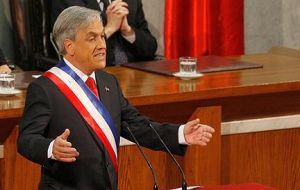MercoPress. South Atlantic News Agency
Piñera admits mistakes in presidential speech but falls short of expectations on education
 The Chilean president in his annual state of the country speech to Congress
The Chilean president in his annual state of the country speech to Congress Chilean leader Sebastián Piñera delivered on Monday his “Presidential Message” at the National Congress in Valparaiso amidst the lowest approval ratings of his presidential career and the shouts of an estimated 8.000 protesters gathering just blocks away.
“I know that we have made mistakes, and I ask forgiveness for them. But I also know that we have worked tirelessly and given the best of ourselves to fulfil our commitments and the measure up to the challenges that Chile faces today.” Piñera said.
Over the rest of his two-hour speech, the president proceeded to highlight his administration’s progress toward “a freer, fairer and more prosperous Chile” over the past two years, touching on areas such as health, infrastructure, the economy, human rights and education, among others.
Key among Piñera’s announcements was the construction of a bridge to Chile’s southern Chiloe Island, as well as a new food voucher for the country’s poorest in the amount of 40,000 Chilean pesos (US$80) per family, plus an additional 7,500 pesos (US$15) per child.
The topic of education also held particular weight in Piñera’s speech. According to a poll earlier this month at Chile’s Centre for Public Studies (CEP), education has now become the country’s No. 1 concern and the president’s lack of action in this area is a major contributor to his low approval rating.
In his speech, Piñera asserted that he truly was dedicated to this cause.
“The Chilean government is deeply committed to educational reform that guarantees our children access to a quality education”.
“Today we invest one in every five pesos of the public budget, equivalent to 12 billion dollars in the education of our children, which is double that of six years ago.”
The president also emphasized the number of university scholarships that his administration has provided: 280.000 per year, more than twice the number given out in 2009 before he took office.
The president’s critics, however, would argue that Piñera missed the point entirely.
“We need a (deep) change to the educational system- not just more scholarships, but a change in the fundamental logic” Sen. Juan Pablo Letelier of Chile’s Socialist Party (PS) told the press after the president’s speech.
Opposition politicians were also disappointed in the speech for issues that remained unaddressed, such as potential reforms to Chile’s binomial system, which requires political candidates to run for office in pairs and earn twice the votes as any other pair of candidates in order to win. This system has been criticized for being unreceptive to the true voice of Chilean citizens.
“We thought that this was the last opportunity for the president to propose serious political reforms,” Dep. Carolina Tohá (PPD) said, citing the binomial system as an area of particular importance. “But there was nothing in that field.”
Also absent from the president’s speech was the possibility of a minimum wage increase, which was the very issue that motivated the 8.000 protesters to march on the National Congress.
“Nothing with respect to the demands that social actors have presented was expressed in the speech,” said Jaime Gajardo, general secretary of the Unified Center of Workers (CUT), the group that organized the protest.
By David Pedigo - The Santiago Times

![“It is not that [Gallo's] mission has been aborted. We have given him a hard blow thanks to the State security agencies,” Cabello underlined](/data/cache/noticias/102697/130x80/diosdado.jpg)


Top Comments
Disclaimer & comment rulesCommenting for this story is now closed.
If you have a Facebook account, become a fan and comment on our Facebook Page!